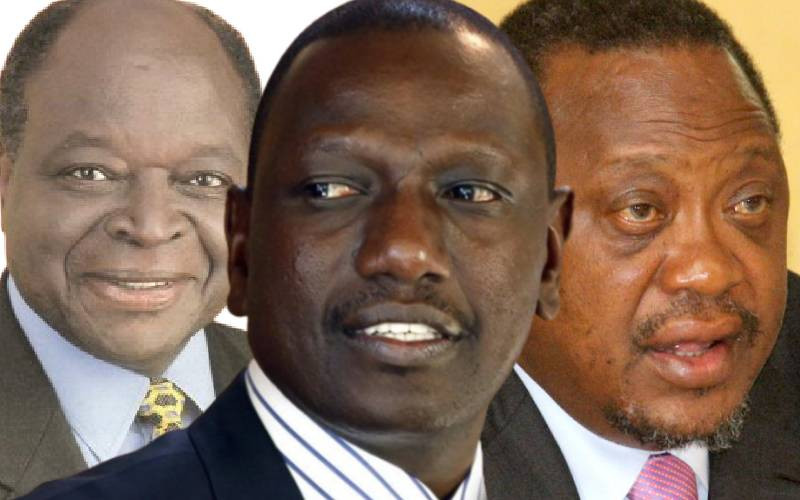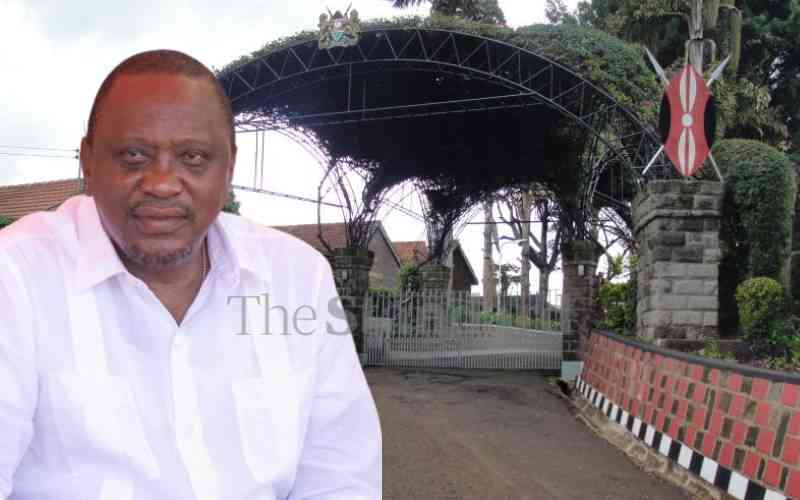 |
Members of the National Assembly in the new chambers. Jubilee is seeking to lure
small parties to gain numbers in Parliament. [PHOTO: FILE/STANDARD] |
By Stephen Makabila
KENYA: Is President Uhuru Kenyatta’s Jubilee Coalition inching closer to the elusive but decisive two-thirds majority in the National Assembly?
Jubilee Coalition Majority leader-designate, Garissa Town MP Aden Duale, says the coalition has so far secured the support of 216 members of the National Assembly.
That means Uhuru’s Jubilee is only short of 16 MPs to achieve the 232 threshold required to have full command of the National Assembly.
Since being declared winner of the March 4 presidential election, Uhuru has lured over 10 political parties to the Jubilee coalition in post-election agreements. The major political parties to have joined the Jubilee coalition include United Democratic Forum of former presidential candidate Musalia Mudavadi and New Ford-Kenya of Eugene Wamalwa.
Counter
Others are the Alliance Party of Kenya headed by Meru Senator Kiraitu Murungi, Kanu whose chairman is Baringo Senator Gideon Moi, and Kadu Asili among others.
Hamisi MP Charles Gimose, of Liberal Party of Kenya has decided to work with Jubilee, despite his party being in CORD.
UDF and Kadu-Asili were the latest to join Jubilee, a day to the inauguration of Uhuru as the fourth president at Kasarani last Tuesday.
The move by UDF to join Jubilee saw the Mudavadi-led Amani coalition, become part of the ruling club.
CORD under the leadership of co-principals, Raila Odinga, Kalonzo Musyoka, and Bungoma Senator Moses Wetangula plan a strong opposition to counter the Jubilee regime.
But can Jubilee win 16 more MPs to its side? What will be the likely effects of a House under the full command of the President’s coalition?
“With power, anything is possible. Even if Jubilee does not get the numbers now; it would in the long run. Some MPs in the opposition are likely to be vulnerable along the way,” says political analyst, Martin Mulwale of Maseno University.
Sources told The Standard On Sunday there were attempts to lure Kalonzo, to also join Jubilee.
“We have discussed this thing with him (Kalonzo). He, however, has some reservations on the move. We hope with time, things are going to ease out,” said Solomon Kinyanjui, a member of Wiper who contested the Kajiado County Senate seat on the party ticket during the March 4 elections.
Stay informed. Subscribe to our newsletter
Numbers are particularly going to be crucial for Jubilee in the National
Assembly, given its vetting role for major presidential appointments.
Those to be vetted by the House include Cabinet Secretaries, Principal Secretaries, ambassadors, members of judicial commissions and other top public appointments.
Already, Jubilee is in control of the House, with Speaker Justin Muturi and his Deputy Joyce Laboso coming from the coalition.
Jubilee still is going to have the Majority Leader slot in the House, through Dualle, a close ally of President Uhuru and Deputy President William Ruto.
Political analysts say dangers of Jubilee having an absolute control in the National Assembly could be the temptation to tamper with the Constitution.
Indeed, the CORD leadership has hit out at Jubilee for winning over some smaller parties that were originally in CORD, claiming it was a move designed to emasculate the opposition. This could drive the country back to single party dictatorship, they say.
Democracy
Part of the reason Kalonzo is reported to have rejected Jubilee overtures was that he is against the country having a weaker opposition, and thus drifting towards the single party era, where the ruling party has control to do whatever it wants.
Uhuru has, however, affirmed his commitment to implement the Constitution. He has also given similar assurance on devolution process, which is causing political anxiety.
And speaking during the signing of post-election agreement between Jubilee and UDF, Uhuru had noted the Jubilee Alliance was reaching out to other political parties to work together and entrench democracy and not to destroy the opposition.
“The law is very clear on coalitions. Jubilee coalition is not mutilating political parties as claimed in some quarters. It is reaching out to them as entities to work together for the betterment of all Kenyans,” noted Uhuru. Adding, the country needed the opposition to keep the Executive on its toes.
On his part, Ruto had also welcomed UDF saying post-election agreements were being made in the best interest of all Kenyans.
Raided opposition
Immediate former Justice Minister, Eugene Wamalwa, argues political parties that had entered post-election agreements with Jubilee had done so for the national good.
“There is need for us to join hands, preach peace and unity, and move the country forward,” added Wamalwa.
Mudavadi declared all UDF leaders had agreed to support Jubilee.
But what seems to be of concern in some quarters was that while MPs in political parties that have signed post-election deals with Jubilee remain in their original parties, their loyalty in the House could be solidly in Jubilee.
In the early 1990s, the then ruling party Kanu, raided opposition MPs leading to defections and by-elections.
The National Assembly aside, Jubilee also enjoys higher numbers in the Senate, where it bulldozed the election of former Turkana Central MP David Ekwe Ethuro as the Speaker, with Murang’a Senator Kembi Gitura as his deputy.
That means the coalition will also secure the position of Senate Majority Leader.
 The Standard Group Plc is a
multi-media organization with investments in media platforms spanning newspaper
print operations, television, radio broadcasting, digital and online services. The
Standard Group is recognized as a leading multi-media house in Kenya with a key
influence in matters of national and international interest.
The Standard Group Plc is a
multi-media organization with investments in media platforms spanning newspaper
print operations, television, radio broadcasting, digital and online services. The
Standard Group is recognized as a leading multi-media house in Kenya with a key
influence in matters of national and international interest.
 The Standard Group Plc is a
multi-media organization with investments in media platforms spanning newspaper
print operations, television, radio broadcasting, digital and online services. The
Standard Group is recognized as a leading multi-media house in Kenya with a key
influence in matters of national and international interest.
The Standard Group Plc is a
multi-media organization with investments in media platforms spanning newspaper
print operations, television, radio broadcasting, digital and online services. The
Standard Group is recognized as a leading multi-media house in Kenya with a key
influence in matters of national and international interest.









